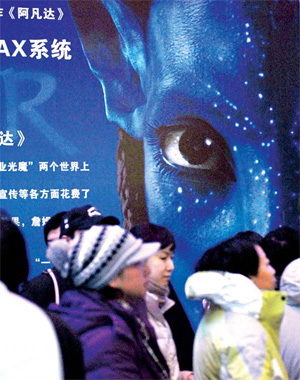Avatar paves the way for boomtime at the cinema
 |
|
A large queue forms outside UME International Cineplex in Beijing hoping for tickets to see the new 3D blockbuster Avatar despite the freezing temperature. [Wei Yao] |
Liu Hui's voice became hoarse during one of the most exciting days she's ever had in seven years as a cinema operator. Everybody who knew her called in, hoping their personal relationship with her would enable them to buy a ticket for the latest blockbuster film, Avatar.
Sadly for them, Liu couldn't help.
"Don't you know it is the most difficult thing in China now?" she said to her friends. Downstairs, a 30-meter queue formed during the coldest weather in Beijing for decades.
Avatar, the most successful 3D film ever, took more than $1.3 billion in 24 days worldwide. It is increasing Chinese cinema managers' expectations over profits this year - and their commitment to develop the 3D sector.
Liu predicted the box-office income from Avatar from Jan 4 to Feb 28 would be as much as 37 percent of total sales last year. That is, nearly 33 million yuan, said the general manager assistant at UME International Cineplex, one of the biggest cinema companies in Beijing,
According to statistics from the China Film Group Corporation, up until Jan 12, the eighth day after Avatar's release on the mainland, cinemas earned more than 300 million from the film.
Sales at IMAX cinemas, which feature a larger-scale 3D system with a standard screen 22 meters wide and 16.1 meters high, accounted for 72 percent of Avatar's performance at UME, while ordinary 3D box office takings were up 27.2 percent. Non-3D box office revenues rose only 0.8 percent, said Liu.
The figures made her feel justified in buying 11 3D systems since 2007. Each cost the company more than 10,000 yuan to equip and decorate. She believes the investment will produce a big harvest in the coming years.
"In 2010, bolstered by 3D films, we anticipate two cinemas we own will make no less than 130 million yuan, a 46 percent increase compared with the 89 million yuan takings in 2009," she said, adding that one new cinema opened at the beginning of this year would make the earnings even bigger.
Kang Xuejun, general manager of Broadway Cinemas, purchased 26 sets of new 3D equipment just before the first public showing of the movie, but denied Avatar was his main target.
"It is an irreversible tendency that 3D films will become the mainstream in Chinese cinemas after Avatar hit the market because the number of 3D films will probably rise to nearly a dozen and more Chinese film makers are likely to produce 3D versions," he said.
Now half of the systems in five cinemas he manages can handle 3D films. Tickets are priced 60 to 70 percent higher and contribute triple the revenue compared with ordinary 2D films.
Both Liu and Kang planned to strengthen their 3D offerings but ruled out IMAX, the most profitable 3D system.
"One IMAX costs as much as 13 million yuan for the projector and screen. That's quite expensive, considering only five to six foreign IMAX films would be released here every year. Furthermore, production of such films in China is still in its infancy," said Liu.
Kang added pressure on space was also a major factor. IMAX takes up more room and requires higher construction quality and stronger structures.
Go to Forum >>0 Comments
 Add your comments...
Add your comments...
- User Name Required
- Your Comment
- Racist, abusive and off-topic comments may be removed by the moderator.
 0
0 






